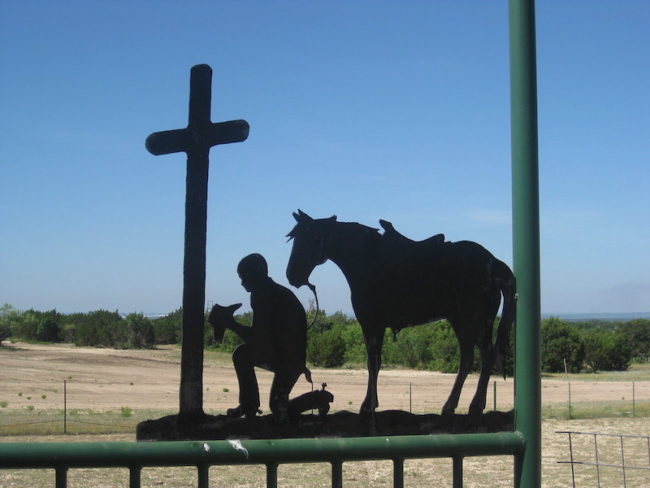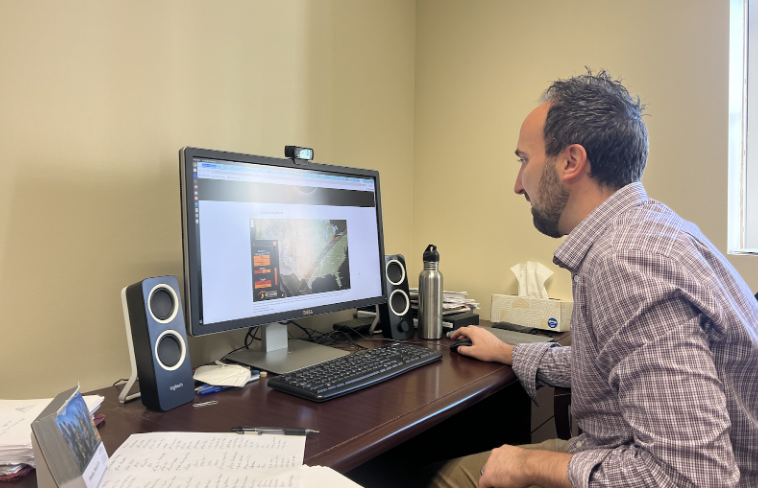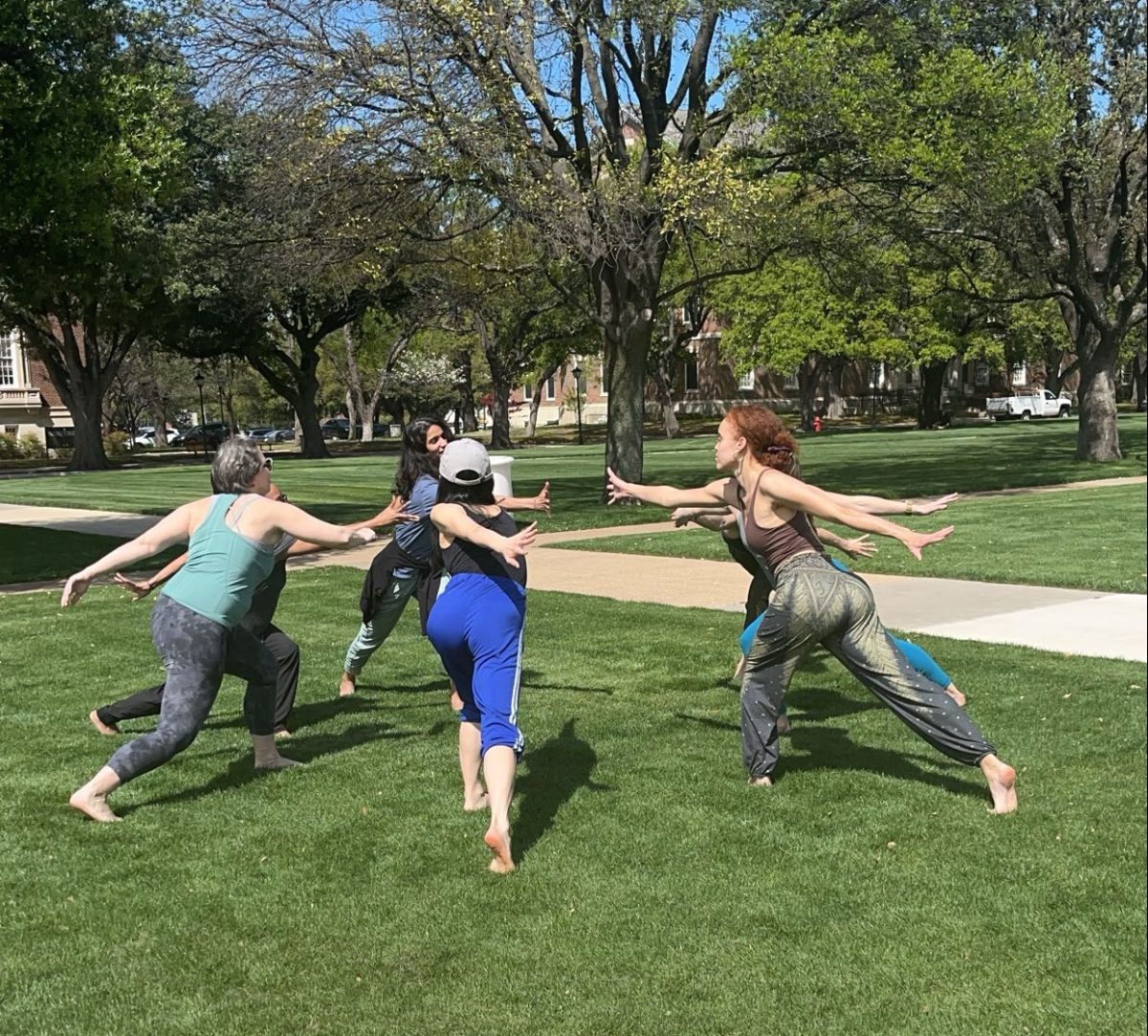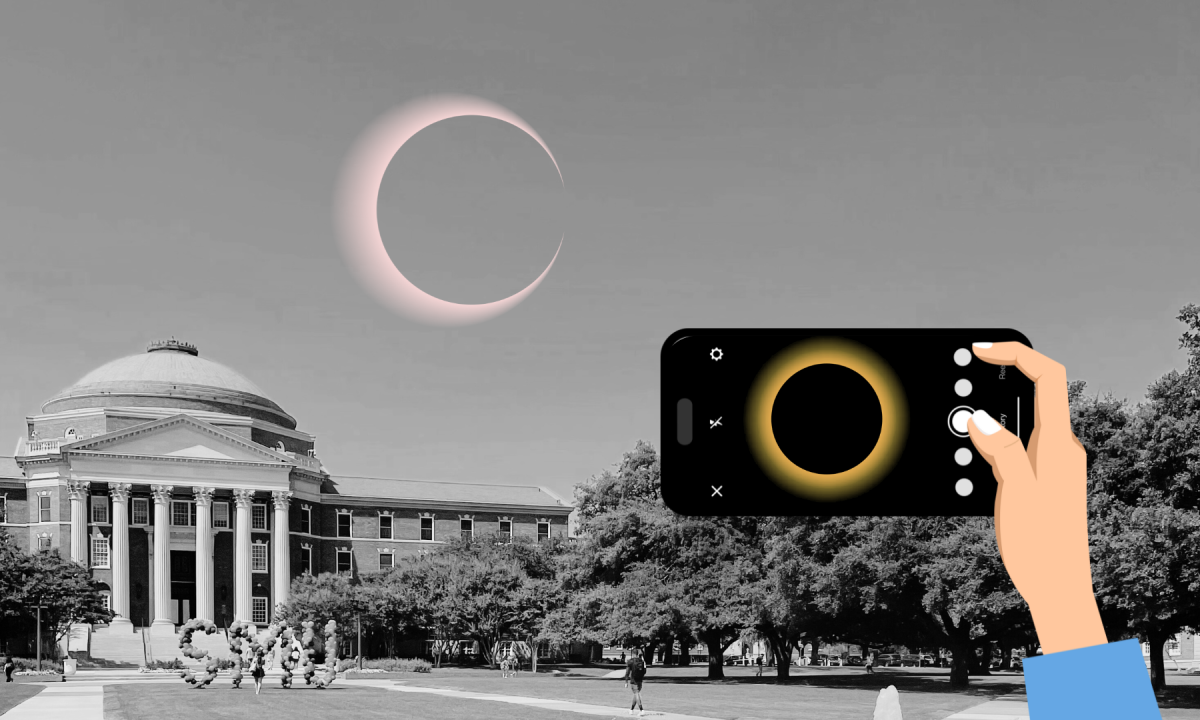On an overcast Sunday morning in Waxahachie, Texas, a man sits on a horse in the median between the Highway 287 and the access road. He wears a white cowboy hat and stylish brown cowboy boots as he waves excitedly to passing cars. The horse beneath him shuffles slightly, trampling the bluebonnet flowers that grow in the small patch of grass beneath its feet. The scene is straight out of a postcard, so stereotypically Texan that it seems impossible to have occurred organically.
Across the access road sits the Cowboy Church of Ellis County. The man on horseback is a greeter, the kind that would welcome congregants and distribute bulletins at a traditional church, all while wearing a well-tailored suit. But at the Cowboy Church of Ellis County, the greeters wear cowboy hats and blue jeans. Some stand at the door and give a hearty handshake to everyone who enters, while others perch atop horses, directing churchgoers over a cattle guard and into the parking lot, past a large sign that reads “all horses entering property must have proof of negative Coggins.”
The Cowboy Church of Ellis County is the largest cowboy church in the world, and it claims to be “changing lives by boldly proclaiming the Gospel to the western culture.” Congregants feel the western cultural influence as soon as they walk through the door, the familiar twang of the country band filling the auditorium. Worship songs align to a country music tune, performed with guitars and fiddles.
After the band finishes playing and the announcements read, several men approach the stage. One of the men is pastor Gary Morgan, who informs the congregation that baptism will take place before he gives his sermon. A young man from Stephenville named Logan stands in front of a large metal trough beside the stage, and after the pastor says a few words, Logan is dunked backward into the trough, emerging completely soaked as Morgan announces that he is “raised to walk in a new way of life.”
Afterward, Morgan begins his sermon, preaching about false beliefs within the Christian church regarding good and evil. The sermon is devoid of complex verbiage, making it accessible to all members of the congregation, including the children.
Jeannie Thorne, a Southern Baptist who has attended services at the Cowboy Church of Ellis County for seven years, says that Morgan’s sermons are what keeps her coming back each Sunday.
“I think he preaches from the word of God, and I think he preaches from his heart,” Thorne says. “I think he is totally a servant in that he wants everyone to be able to know God and follow his ways.”
The appeal of the Cowboy Church of Ellis County, however, is not merely its preacher. Services take place in a large auditorium rather than in a chapel or cathedral. The room exhibits saddles, lassoes, and Native American tribal blankets. Wooden fencing lines the ceiling where crown molding should be. Churchgoers wear blue jeans, cowboy boots, sneakers, and sweatshirts. There is not a suit or tie in sight.
“I think it definitely is a ‘come as you are’ place,” Thorne says. “Everyone is welcome. It does not matter what your beliefs might be. You can come dressed up or you can come in your casual wear, it does not matter. I don’t believe anyone judges you.”
Churchgoers do not have to dress up to hear the word of God on Sunday. At the Cowboy Church of Ellis County, putting on your “Sunday Best” means putting on just about anything, from sneakers to flip flops to cowboy boots.
About 30 miles away, on a particularly barren stretch of land beside Interstate 45, The Cowboy Church of Ennis stands. This church is smaller than the Cowboy Church of Ellis County, but the ambiance is remarkably similar. At the Cowboy Church of Ennis, the walls flaunt saws, fishing poles, rakes, and wooden crosses. A large cowhide hangs above the fireplace at the back of the room, thick southern accents echoing between dark wood walls as congregants introduce themselves to one another. Taxidermy deer heads flank the stage at the front of the room, lassos, and saddles strewn about the elevated surface. Four men in cowboy hats stand on the stage, tuning their musical instruments.
“Good morning!” Pastor Michael Howard says into the microphone. “Are y’all wonderful today?”
Like the Cowboy Church of Ellis County, the Cowboy Church of Ennis is a fundamentalist church that celebrates western heritage culture, yet it ministers to anyone, not just cowboys. Beyond its Sunday worship services, the Cowboy Church of Ennis hosts other western-themed religious events like skeet shooting, pond fishing, “Trails Class,” and quilting groups. These events aim to spread the word of God through stereotypically western activities, thereby connecting the cowboy culture found in parts of Texas with the religious experience promoted by the church.
However, cowboy churches are not exclusive to Texas. Cowboy churches exist in any state that prides itself on its western heritage. Matt Marino, the lead pastor at Trinity Episcopal Parish in St. Augustine, Florida, was first exposed to cowboy churches when he lived in Wickenburg, Arizona. Wickenburg is, as Marino calls it, the “dude ranch capital of the world,” home of rodeo champion Cody Custer as well as actor Val Kilmer.
“When we lived there, we had to do Young Life on Wednesday nights because so many high school kids went to the Monday night town ropings,” Marino says.
Young Life is a Christian youth group for high school and college students across the nation, and hold meetings traditionally on Monday evenings. In Wickenburg, however, Young Life meetings were rescheduled to accommodate the townspeople’s devotion to cowboy culture.
“From what I observed, cowboy churches are mostly Southern Baptists trying ‘something new,’” Marino says.
While the Cowboy Church is historically affiliated with the Baptist General Convention and the American Fellowship of Cowboy Churches, it does not minister to a specific Christian denomination. According to the Bar Cross Cowboy Church in Alvarado, Texas, the Cowboy Church “functions as an interdenominational fellowship, gladly welcoming anyone who has accepted Jesus Christ as their Lord and Savior.”
Douglas Richnow, the former Senior Associate Rector at the Church of St. John the Divine in Houston, says that despite the Cowboy Church’s lack of affiliation with a specific denomination, its core Christian message remains the same.
“I’ve always believed that denominations are a good thing,” Richnow says. “Different people are drawn to different types of worship. Cowboy churches are not affiliated with a specific denomination, but the theology and the core values of Christianity are the same. It’s just the worship style that is different.”
Though the Cowboy Church welcomes everyone, the majority of the Cowboy Church’s target demographic consists of individuals from rural areas who rely on agriculture to make a living. Many of the cowboy churches in Texas are located on the outskirts of big cities, away from the bustling urban center, on parts of the interstate surrounded by vast expanses of farmland. Richnow says that people from these areas come to cowboy churches to have a religious experience surrounded by people of a similar cultural background.
“It’s a place where people of a similar socioeconomic status, like ranchers and farmers, can come together to create a church family,” Richnow says.
Cowboy churches are a relatively new phenomenon. The Cowboy Church movement began in 1972 when Glenn Smith, a professional rodeo clown, abandoned his career and devoted himself to spreading the word of God. Smith began ministering to people on the bull riding and rodeo circuits, using traditional western activities as a way to spread his Christian beliefs. Now roughly 5,000 cowboy churches exist throughout the United States.
Not all Christian churches are pleased with the creation of cowboy churches, though. Some traditional Christian groups feel that a church that caters to a specific group of people does not follow the core tenets of Christianity.
According to the Orthodox Presbyterian Church, “a church that targets a specific demographic, be it the young or the old, cowboys or surfers, rockers or hip-hoppers, forfeits apostolicity. Why? Because the apostles did not target specific kinds of people. They cast their gospel nets widely, and their churches, as a consequence, were heterogeneous.”
However, the Cowboy Church maintains that it welcomes people of all backgrounds. As the American Fellowship of Cowboy Churches explains, cowboy churches “are filled with people from all backgrounds, income levels, and interests. AFCC cowboy churches strive to remove as many of the barriers as possible that might be found in the more traditional church settings and offer a more relaxed, ‘come as you are’ atmosphere where everyone is welcome.”
Gary Morgan’s sermon is full of amusing quips and comments, like when he jokes that his father used to mispronounce the book of Job in the Bible. The sermon is lighthearted and easy to understand, prompting people like Jeannie Thorne to come back each Sunday.
“I just totally love it, and I think it’s mainly because of the pastor,” Thorne says. “I really do think he preaches from the word of God.”
Just as Thorne believes that Gary Morgan preaches God’s word, Douglas Richnow says that cowboy churches ascribe to the same fundamental Christian beliefs as other churches around the nation. In spite of the criticism from traditional Christian groups, the Cowboy Church does provide a traditional Christian message.
“They believe in Jesus, they believe in the resurrection, they celebrate Easter, all of the things that Christians do,” Richnow says.
At its core, the Cowboy Church allows Christianity and Texas pride to intertwine. Texas is known for its ranches and rodeos, and many rural Texans identify with the cowboy image because their occupations closely link with the farming and livestock industry that created the stereotype in the first place. The Cowboy Church gives them a place where they don’t have to choose between being a cowboy and a Christian. It allows congregants to wear their cowboy boots with pride at church on Sunday, and it doesn’t make them check their cowboy hats at the door.



















